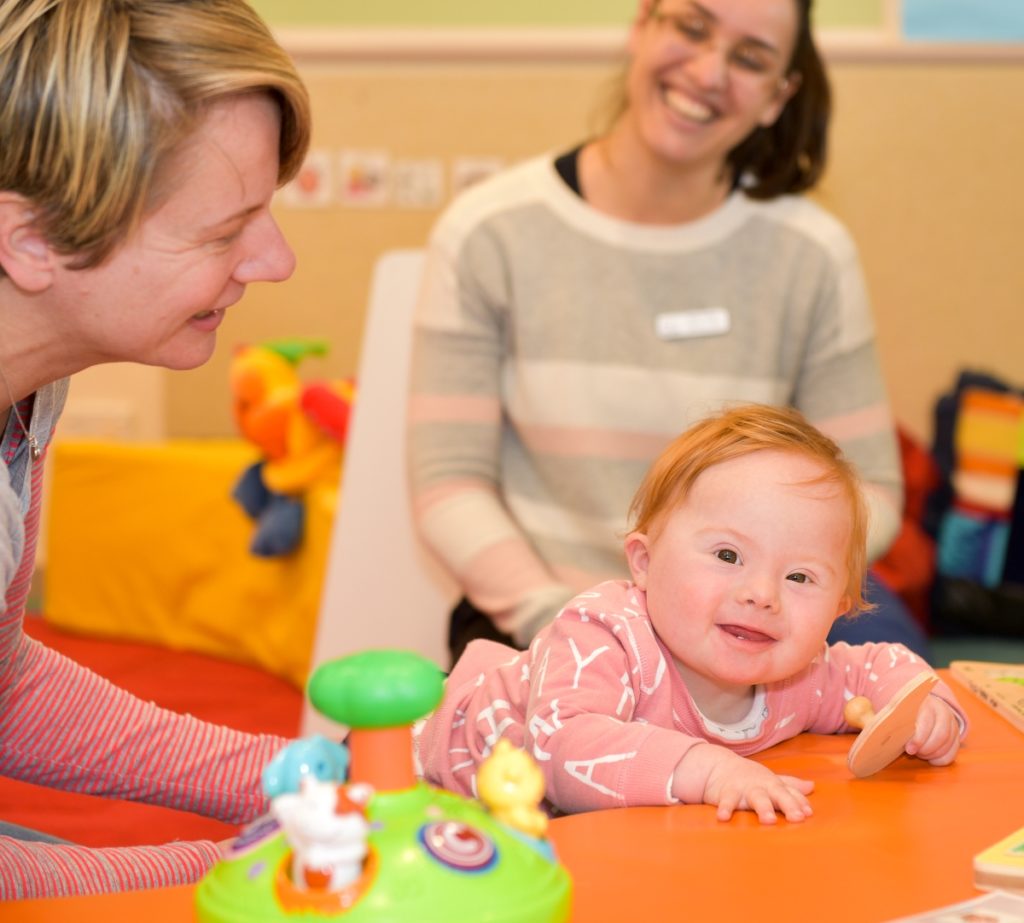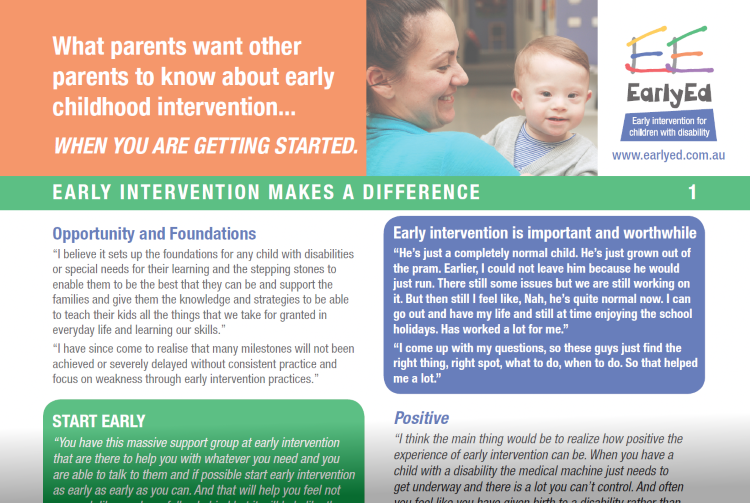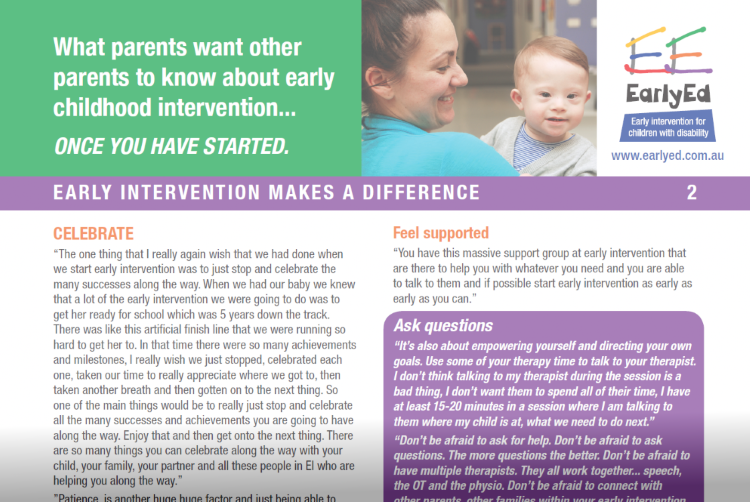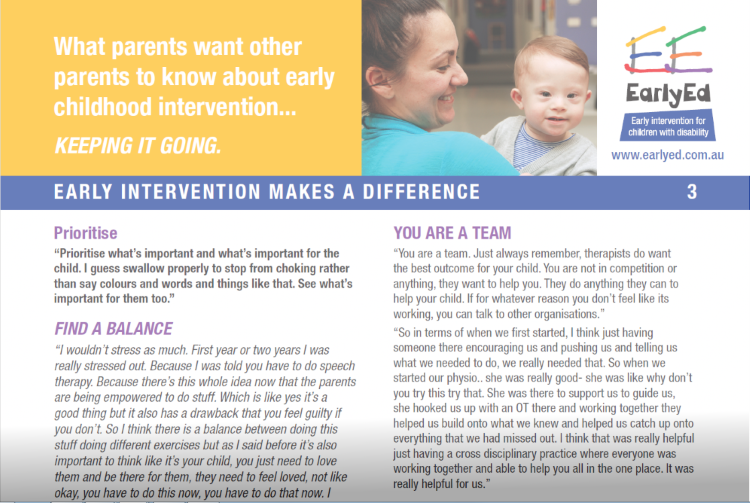
“I wish that I knew that the earlier we started early intervention the better. I wish that I knew that it was going to be a long journey and for us not to give up hope or get distracted or get down on ourselves.” Steph, mother of Christian.
Parents Helping Parents
Here you will find valuable information from parents that have come together to share what they wish they had known when their baby was diagnosed with a disability. They hope that this will help new parents and those who work with them. The material collected is part of a research project designed with parents to support parents in the future.
This information is broken up into two sections:
Resources
How To Use This Resource
You will find here videos and fact sheets that share key messages from families. They cover 3 stages of early intervention.
1. When You Are Getting Started
2. Once You Have Started
The Project
“Think about when you started early intervention. Looking back, what do you think would have helped you?”
In answering this question a group of parents who have had a baby involved with early childhood intervention have shared their stories about what would have and did help them.
By sharing their lived experience, parents help us know what really matters in the early days of early intervention, and why.
Parents have come together because they want to help create resources for other families. They understand that
- “Families new to a diagnosis start out knowing nothing.”
- “No one knows what EI (early intervention) means.”
- It is “important to provide support not just for the child with a disability but also for the whole family.
- “Good advice and support at birth lays the foundation for how families cope.”
The stories and the resources presented here make a start at helping parents feel “like they have some control over information they receive and how they receive it.” Parents felt it is important to have “something to read, view clips and some research” that is “conversational”, “practical”, helps you to know “What do I do next” and “gives you something tangible to do!”

A. Project Background
EarlyEd actively promotes the importance of access to early intervention as early in their life as possible for babies with a diagnosed disability or a risk of delays. This is reflected by our prioritisation of babies referred to services and our campaigns to maintain seamless pathways to services for families with a baby.
In April 2018, EarlyEd received a short-term grant Innovation in Family-Centred Practice Grant to continue our work promoting family-centred practice in early childhood intervention for babies and their families. We wanted to find out what families with babies wanted and felt they needed from early intervention. Our searches had identified a gap in information available to families about early intervention and certainly from families with babies.
This project provide families with the opportunity to share their wisdom about early childhood intervention and create resources for families and providers of services.
Both the project topic and its design reflects EarlyEd’s commitment to recognised best practices in early intervention through family-centred approaches. Families who had been involved babies in early intervention with a baby recently or years ago, early childhood intervention practitioners and community agencies came together to co-design the project. This project has created an opportunity for families to share their significant knowledge and experience defining the issues to address, selecting questions and ways to obtain the information as well as to give their insights.
This identified a need for resources available to parents. It was decided that this would be best met by us collecting video, audio and written stories from parents. This resulted in us collecting wisdom and stories about the lived-experience from 14 families from across Sydney and later x from the Illawarra.
B. What Were Parents Asked?
The information shares what it was like to have a baby with a disability, what they would like to have known about and what really mattered.
These are the questions asked at each interview:
“Please think about when you started early intervention. Looking back, what do you think would have helped you?
- What do you know now that you that you wished you knew then and that you would like other families to know?
- What might be helpful for others to think about when they are starting out on the Early Childhood Intervention journey?
- Would there be something that you would do differently or ask for?”
C. The Results
After looking at the large amount of data and how to make use of it a decision was made to firstly analyse the data to identify themes. From this we found we could
- create short video pieces
- fact sheets
A qualitative content analysis was able to identify 49 subcategories of key themes. These feel into 3 main areas:
- When you are getting started
- Once you have started
- Keeping it going
To share this information the video messages are designed to be shared across the community through social media and available as a whole along with the fact sheets on a website.
D. The Future
EarlyEd is continuing to analyse and collect stories and add in resources for families and practitioners. We are keen to hear from other families in the future. This is particularly important as pathways for referral to services get disrupted easily. This is in evidence now as the National Disability Insurance Scheme rolls out through various phases.
Families involved in the co-design sessions indicated a need for research information and contact numbers. To do this we welcome further future funding. EarlyEd focuses many of our applications for grants and funding on projects that can be used to build awareness and provide services to babies as soon as they need it.
Contact us to be involved.
Project Acknowledgement
This resource has been produced by EarlyEd, having been commissioned by ECIA NSW/ACT from grant monies provided by NSW Department of Family and Community Services, Ageing, Disability and Homecare (FACS ADHC) and administered by Early Childhood Intervention Australia (National peak body).


